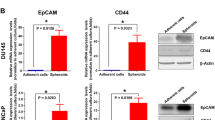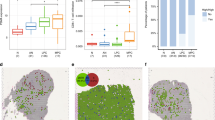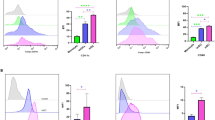Abstract
Personalized peptide vaccination is a promising immunotherapeutic approach in prostate cancer (PCa). We therefore examined whether an approach, utilizing personalized multiple peptide-mediated ex vivo enrichment with effector T cells reactive to multiple tumor-associated antigens (TAAs), could be employed as a basis for the development of T cell immunotherapy of PCa. In this study, we used the non-adherent fraction (lymphocytes) of cryopreserved peripheral blood mononuclear cells from a leukapheretic product of biochemically recurrent (BR, n = 14) and metastatic hormone-refractory (HR, n = 12) PCa patients. The lymphocytes were primed with a pool of mixed overlapping peptides derived from 6 PCa TAAs–PSA, PAP, NY-ESO-1, MAGE-A1, MAGE-A3 and MAGE-A4. After 2 weeks of culture, the cells were stimulated with the peptides and T cell reactivity determined by externalization of CD107a. No TAAs-reactive effector T cells were detected in the patient’s lymphocytes after their reconstitution. However, following their priming with the TAAs-derived peptides and 2-week culturing, the lymphocytes became enriched with polyclonal TAAs-reactive effector CD8+ T cells in 8 out of 14 BR and 5 out of 12 HR patients. No such reactive CD8+ T cells were detected in cultured lymphocytes without the peptide priming. Stimulation of the responding cultures with peptides derived from individual TAAs revealed a unique repertoire of the reactive CD8+ T cells. Our strategy revealed that the personalized multiple peptide-mediated ex vivo enrichment with multiple TAAs-reactive T cells in the PCa patient’s lymphocytes is a viable approach for development of T cell immunotherapy of PCa.






Similar content being viewed by others
Abbreviations
- ACT:
-
Adoptive cell transfer
- TAAs:
-
Tumor-associated antigens
- PCa:
-
Prostate cancer
- TILs:
-
Tumor-infiltrating lymphocytes
- PSA:
-
Prostate-specific antigen
- PAP:
-
Prostatic acid phosphatase
- PSMA:
-
Prostate-specific membrane antigen
- DCs:
-
Dendritic cells
- PPV:
-
Personalized peptide vaccination
- PBMCs:
-
Peripheral blood mononuclear cells
- NY-ESO-1:
-
New York esophageal squamous cell carcinoma-1
- MAGE-A:
-
Melanoma-associated antigen
- BR:
-
Biochemically recurrent prostate cancer
- HR:
-
Hormone-refractory prostate cancer
References
Rosenberg SA, Restifo NP. Adoptive cell transfer as personalized immunotherapy for human cancer. Science. 2015;348(6230):62–8. doi:10.1126/science.aaa4967.
Zhong S, Malecek K, Johnson LA, Yu Z, Vega-Saenz de Miera E, Darvishian F, et al. T-cell receptor affinity and avidity defines antitumor response and autoimmunity in T-cell immunotherapy. Proc Natl Acad Sci U S A. 2013;110(17):6973–8. doi:10.1073/pnas.1221609110.
Vigano S, Utzschneider DT, Perreau M, Pantaleo G, Zehn D, Harari A. Functional avidity: a measure to predict the efficacy of effector T cells? Clin Dev Immunol. 2012;2012:153863. doi:10.1155/2012/153863.
Ioannidou K, Baumgaertner P, Gannon PO, Speiser MF, Allard M, Hebeisen M, et al. Heterogeneity assessment of functional T cell avidity. Sci Rep. 2017;7:44320. doi:10.1038/srep44320.
Parkhurst M, Gros A, Pasetto A, Prickett T, Crystal JS, Robbins P, et al. Isolation of T-Cell receptors specifically reactive with mutated tumor-associated antigens from tumor-infiltrating lymphocytes based on CD137 expression. Clin Cancer Res. 2016;. doi:10.1158/1078-0432.CCR-16-2680.
Gordon IO, Tretiakova MS, Noffsinger AE, Hart J, Reuter VE, Al-Ahmadie HA. Prostate-specific membrane antigen expression in regeneration and repair. Mod Pathol. 2008;21(12):1421–7. doi:10.1038/modpathol.2008.143.
Vavrova K, Vrabcova P, Filipp D, Bartunkova J, Horvath R. Generation of T cell effectors using tumor cell-loaded dendritic cells for adoptive T cell therapy. Med Oncol. 2016;33(12):136. doi:10.1007/s12032-016-0855-4.
Kimura T, Egawa S, Uemura H. Personalized peptide vaccines and their relation to other therapies in urological cancer. Nat Rev Urol. 2017;. doi:10.1038/nrurol.2017.77.
Noguchi M, Kakuma T, Uemura H, Nasu Y, Kumon H, Hirao Y, et al. A randomized phase II trial of personalized peptide vaccine plus low dose estramustine phosphate (EMP) versus standard dose EMP in patients with castration resistant prostate cancer. Cancer Immunol Immunother: CII. 2010;59(7):1001–9. doi:10.1007/s00262-010-0822-4.
Podrazil M, Horvath R, Becht E, Rozkova D, Bilkova P, Sochorova K, et al. Phase I/II clinical trial of dendritic-cell based immunotherapy (DCVAC/PCa) combined with chemotherapy in patients with metastatic, castration-resistant prostate cancer. Oncotarget. 2015;6(20):18192–205. doi:10.18632/oncotarget.4145.
Fucikova J, Podrazil M, Jarolim L, Bilkova P, Hensler M, Becht E et al. Phase I/II trial of dendritic-cell based active cellular immunotherapy with DCVAC/PCa in patients with rising PSA after primary prostatectomy or salvage radiotherapy for the prostate cancer. Cancer Immunol Immunother: CII. 2017 (In Press).
Rožková D, Tišerová H, Fučíková J, Lašt’ovička J, Podrazil M, Ulčová H, et al. FOCUS on FOCIS: combined chemo-immunotherapy for the treatment of hormone-refractory metastatic prostate cancer. Clin Immunol. 2009;131(1):1–10. doi:10.1016/j.clim.2009.01.001.
Fucikova J, Moserova I, Truxova I, Hermanova I, Vancurova I, Partlova S, et al. High hydrostatic pressure induces immunogenic cell death in human tumor cells. Int J Cancer. 2014;135(5):1165–77. doi:10.1002/ijc.28766.
Hudolin T, Juretic A, Spagnoli GC, Pasini J, Bandic D, Heberer M, et al. Immunohistochemical expression of tumor antigens MAGE-A1, MAGE-A3/4, and NY-ESO-1 in cancerous and benign prostatic tissue. Prostate. 2006;66(1):13–8. doi:10.1002/pros.20312.
Betts MR, Brenchley JM, Price DA, De Rosa SC, Douek DC, Roederer M, et al. Sensitive and viable identification of antigen-specific CD8+ T cells by a flow cytometric assay for degranulation. J Immunol Methods. 2003;281(1–2):65–78.
Rubio V, Stuge TB, Singh N, Betts MR, Weber JS, Roederer M, et al. Ex vivo identification, isolation and analysis of tumor-cytolytic T cells. Nat Med. 2003;9(11):1377–82. doi:10.1038/nm942.
Japp AS, Kursunel MA, Meier S, Malzer JN, Li X, Rahman NA, et al. Dysfunction of PSA-specific CD8+ T cells in prostate cancer patients correlates with CD38 and Tim-3 expression. Cancer Immunol Immunother: CII. 2015;64(11):1487–94. doi:10.1007/s00262-015-1752-y.
Hebeisen M, Allard M, Gannon PO, Schmidt J, Speiser DE, Rufer N. Identifying individual T cell receptors of optimal avidity for tumor antigens. Front Immunol. 2015;6:582. doi:10.3389/fimmu.2015.00582.
Maia MC, Hansen AR. A comprehensive review of immunotherapies in prostate cancer. Crit Rev Oncol/Hematol. 2017;113:292–303. doi:10.1016/j.critrevonc.2017.02.026.
Dalgleish AG. Rationale for combining immunotherapy with chemotherapy. Immunotherapy. 2015;7(3):309–16. doi:10.2217/imt.14.111.
Kang J, Demaria S, Formenti S. Current clinical trials testing the combination of immunotherapy with radiotherapy. J Immunother Cancer. 2016;4:51. doi:10.1186/s40425-016-0156-7.
Kalina JL, Neilson DS, Comber AP, Rauw JM, Alexander AS, Vergidis J, et al. Immune modulation by androgen deprivation and radiation therapy: implications for prostate cancer immunotherapy. Cancers. 2017;9(2):13. doi:10.3390/cancers9020013.
Noguchi M, Uemura H, Naito S, Akaza H, Yamada A, Itoh K. A phase i study of personalized peptide vaccination using 14 kinds of vaccine in combination with low-dose estramustine in HLA-A24-positive patients with castration-resistant prostate cancer. Prostate. 2011;71(5):470–9. doi:10.1002/pros.21261.
Noguchi M, Moriya F, Suekane S, Ohnishi R, Matsueda S, Sasada T, et al. A phase II trial of personalized peptide vaccination in castration-resistant prostate cancer patients: prolongation of prostate-specific antigen doubling time. BMC Cancer. 2013;13:613. doi:10.1186/1471-2407-13-613.
Noguchi M, Arai G, Matsumoto K, Naito S, Moriya F, Suekane S, et al. Phase I trial of a cancer vaccine consisting of 20 mixed peptides in patients with castration-resistant prostate cancer: dose-related immune boosting and suppression. Cancer Immunol Immunother: CII. 2015;64(4):493–505. doi:10.1007/s00262-015-1660-1.
Landsberg J, Kohlmeyer J, Renn M, Bald T, Rogava M, Cron M, et al. Melanomas resist T-cell therapy through inflammation-induced reversible dedifferentiation. Nature. 2012;490(7420):412–6. doi:10.1038/nature11538.
Bethune MT, Joglekar AV. Personalized T cell-mediated cancer immunotherapy: progress and challenges. Curr Opin Biotechnol. 2017;48:142–52. doi:10.1016/j.copbio.2017.03.024.
Schumacher TN, Schreiber RD. Neoantigens in cancer immunotherapy. Science. 2015;348(6230):69–74. doi:10.1126/science.aaa4971.
Olsson AY, Bjartell A, Lilja H, Lundwall A. Expression of prostate-specific antigen (PSA) and human glandular kallikrein 2 (hK2) in ileum and other extraprostatic tissues. Int J Cancer. 2005;113(2):290–7. doi:10.1002/ijc.20605.
Graddis TJ, McMahan CJ, Tamman J, Page KJ, Trager JB. Prostatic acid phosphatase expression in human tissues. Int J Clin Exp Pathol. 2011;4(3):295–306.
Suzuki N, Maeda Y, Tanaka S, Hida N, Mine T, Yamamoto K, et al. Detection of peptide-specific cytotoxic T-lymphocyte precursors used for specific immunotherapy of pancreatic cancer. Int J Cancer. 2002;98(1):45–50.
Maeda Y, Ito M, Harashima N, Nakatsura T, Hida N, Imai N, et al. Cleavage and polyadenylation specificity factor (CPSF)-derived peptides can induce HLA-A2-restricted and tumor-specific CTLs in the majority of gastrointestinal cancer patients. Int J Cancer. 2002;99(3):409–17. doi:10.1002/ijc.10377.
Hida N, Maeda Y, Katagiri K, Takasu H, Harada M, Itoh K. A simple culture protocol to detect peptide-specific cytotoxic T lymphocyte precursors in the circulation. Cancer Immunol Immunother: CII. 2002;51(4):219–28. doi:10.1007/s00262-002-0273-7.
Kim MT, Kurup SP, Starbeck-Miller GR, Harty JT. Manipulating memory CD8 T cell numbers by timed enhancement of IL-2 signals. J Immunol. 2016;197(5):1754–61. doi:10.4049/jimmunol.1600641.
Kim MT, Richer MJ, Gross BP, Norian LA, Badovinac VP, Harty JT. Enhancing dendritic cell-based immunotherapy with IL-2/monoclonal antibody complexes for control of established tumors. J Immunol. 2015;195(9):4537–44. doi:10.4049/jimmunol.1501071.
Gizinski AM, Fox DA, Sarkar S. Pharmacotherapy: concepts of pathogenesis and emerging treatments. Co-stimulation and T cells as therapeutic targets. Best practice & research. Clin Rheumatol. 2010;24(4):463–77. doi:10.1016/j.berh.2009.12.015.
Acknowledgements
We would like to thank the clinical research staff, routine laboratory staff and our technicians for their assistance. We thank Dr. Alasdair M. Gilfillan for a critical review of the manuscript.
Funding
Research in the authors’ laboratories was supported by funding of the Charles University—Project GA UK No. 188215 and PRIMUS/MED/12, the Ministry of Health, Czech Republic—Project AZV 16-28135A and the conceptual development fund of research organization University Hospital Motol, Prague, Czech Republic 00064203.
Author information
Authors and Affiliations
Corresponding author
Ethics declarations
Conflict of interest
JB a MP are part-time employees of SOTIO, a.s., a biotech company developing cell-based immunotherapy. JB is a minority shareholder of this company. PT, ZS, KV, Dmitry Stakheev and Daniel Smrz declare no financial or commercial conflict of interest.
Ethical approval
This study was approved by the ethics committee for multicentric studies and evaluation of the Faculty Hospital Motol, Prague, Czech Republic. All procedures performed in studies involving human participants were in accordance with the ethical standards of the institutional and/or national research committee and with the 1964 Helsinki Declaration and its later amendments or comparable ethical standards.
Informed consent
Informed consent was obtained from all individual participants included in the study.
Electronic supplementary material
Below is the link to the electronic supplementary material.
Rights and permissions
About this article
Cite this article
Taborska, P., Stakheev, D., Strizova, Z. et al. Personalized ex vivo multiple peptide enrichment and detection of T cells reactive to multiple tumor-associated antigens in prostate cancer patients. Med Oncol 34, 173 (2017). https://doi.org/10.1007/s12032-017-1035-x
Received:
Accepted:
Published:
DOI: https://doi.org/10.1007/s12032-017-1035-x




